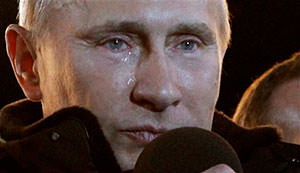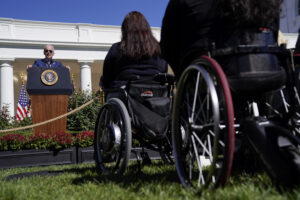The Humanitarians Who Came In From the Cold
Russia is cracking down further on political dissent by requiring foreign humanitarian workers to register, more or less, as spies.
Russia’s ruling United Russia party has recently taken steps to prevent a repeat of last winter’s protests. A new law has drastically raised the fines for participating in unsanctioned demonstrations, and “libelous” accusations, for instance against corrupt politicians, will also be punished in the future.
Most controversial, however is the new Foreign Agents Law. Passed Nov. 21 by the state Duma with 374 out of 378 votes, the law requires all nongovernmental organizations engaged in “political activity” and receiving financial assistance from abroad to register with the Ministry of Justice and provide extensive quarterly reports. Moreover, they have to register as “foreign agents,” a phrase that carries very negative connotations in Russian, meaning about the same as “spy.” Organizations that refuse to comply will face fines of up to $16,000. Repeated refusals deemed by authorities to be “malicious” will result in criminal prosecution. The law targets critics of the government in particular — human rights organizations that speak out against abuses in Chechnya and elsewhere, and independent election observers who triggered protests against voting fraud last year.
The proponents of the new law, among them President Vladimir Putin, claim a need to protect Russia’s national security. This summer, Putin said that “if foreigners pay for political activity, apparently they are expecting to get some result from it.” Foremost on proponents’ minds is the conviction that NGOs are geopolitical weapons of U.S. foreign policy, used to destabilize and weaken Russia’s political system. According to this view, the 2004 Orange Revolution in Ukraine, last year’s protests against fraud during the Russian Duma elections, and pretty much any opposition activity against the Putin regime are all part of the same Western plot against Russia.
The law’s proponents thus claim that nongovernmental organizations that use foreign funds represent the interests of other countries. Putin has rejected all Western criticism of the new law by arguing that it is essentially the same as the Foreign Agents Registration Act (FARA), passed in the United States in 1938 and still in force today. FARA was originally aimed at combating Nazi subversion and requires all international organizations representing foreign interests to register with the Justice Department. Aleksandr Privalov, science editor of the renowned Web journal Expert, disagrees with this analogy. He criticizes the vague wording of the Foreign Agents law. Moreover, while FARA is aimed at regulating organizations that are “fully or to a large extent financed from abroad,” the Russian law forces organizations to register even if they receive just “three rubles” from foreign sources, Privalov says.
Aleksandr Sidiakin, Duma member of United Russia and one of the bill’s sponsors, counters that the law creates much-needed transparency in a crucial area of politics: “The law is aimed at protecting citizens and their rights, so that people can understand who really calls for influencing the political situation in our country — our civil society or foreign agents.”
Putin’s administration estimates that foreign governments, funds and other institutions spend about $216 million on Russian NGOs. The paths that foreign money takes into Russia are, however, not as mysterious as the law’s proponents claim. One may disagree with the politics of organizations like George Soros’ Open Society Fund or the Ford Foundation, but as internationally active foundations, they have to be transparent about the recipients of their funds. Moreover, most foreign money goes to scientific and humanitarian purposes rather than politics. The German Heinrich Böll Foundation provides grants for young historians, and the U.N. Refugee Agency pays for aid to refugees in Chechnya, to cite just two examples. They compensate for the fact that the Russian state fails to provide adequate financial assistance for many of the country’s enormous social problems.
Finally, the claim that Russian NGOs are acting largely free from state interference today is untrue. The Russian Duma already passed a law regulating NGOs in 2006. Critics of the new Foreign Agents law thus consider it to be a means to intimidate and harass civil society. Amnesty International said in a statement that the law was aimed at “silencing the voice of critics” in Russia.
The most well-known Russian NGOs, such as the human rights groups Memorial and Moscow Helsinki Group, and Golos, which uncovered the scale of voter fraud last December, have decided to boycott the registration. All of them are willing to go to court against the Ministry of Justice because they are convinced the law is unconstitutional. They insist that their activity is not political. The law’s vague language considers any NGO political whose goal it is to change state policy or to influence public opinion in any way. In response to the criticism, the law now exempts religious institutions, state corporations and business groups, as well as organizations active in science, culture, art, health services and environmental protection. Human rights activities, however, do not fall under the exceptions and the new law endangers the survival of many human rights organizations.
Take the example of the Moscow Helsinki Group, Russia’s oldest human rights organization. The Helsinki Group declared in November that it derives 90 percent of its financing from international sources and is struggling to find domestic donors. In general, Russian philanthropy is weakly developed. Human rights groups faced with a negative public image are already struggling to attract donations. If the government essentially labels them as spies, this trend will only become more pronounced.
Nonetheless, it would be too simplistic to paint this issue as a clear-cut conflict between human rights organizations and the state. The Helsinki Group recently received a presidential grant from the Russian government. With this money, it can continue its activities at least until May. The problem is that no long-term financing is available in Russia, which makes it hard for civil society actors to plan ahead. The Russian NGOs’ decision to boycott the registration and risk a lawsuit is motivated most of all by a desire for more clarity about the law’s implications.
At this point, even organizations that are engaged in seemingly apolitical humanitarian activities face great insecurities. Nochlezhka (night shelter), for instance, provides shelter for the homeless in St. Petersburg. The organization receives significant funds from an international network of supporters. Because the homeless in Russia lose many of their civil rights, Nochlezhka fights for their reinstatement and criticizes government policy toward the homeless.
“This could be perceived as political activity under the new law,” Grigoriy Sverdlin, the organization’s director, told me. Nonetheless, Nochlezhka decided not to register as a foreign agent, with all the consequences this decision may have. Sverdlin is convinced that his organization is not in the risk group, in which he sees primarily NGOs that monitor elections or criticize corruption. “At the same time, if our activity displeases a highly placed bureaucrat, he can use the new law to make Nochlezhka’s life difficult or even close the organization.”
It is this vagueness and state of insecurity that makes the work of NGOs in Russia so difficult. Because of the law’s wording, even the president’s own human rights council refuses to support the “Foreign Agents” law and demands serious changes and additions. The head of the council, Mikhail Fedotov, wants a clearer definition of the activities a “foreign agent” has to engage in to be in violation. In a meeting with the council, Putin promised further changes.
Andrei Kolesnikov, journalist at the Russian newspaper Novaya Gazeta, sees a deliberate strategy behind the law. Rather than setting a clear legal framework, the law forces civil society actors into a “game with unclear consequences.” Kolesnikov considers the law to be “deceitful and cynical” because the Duma first approves laws and then corrects them, depending on the political situation at the moment. “This creates a puzzling, overly regulated, wiredrawn, reactive and situational legal system.”
It remains unclear to what extent the law will be enforced. Ultimately the Russian government’s intimidation of public watchdogs may succeed by making their existence so risky, complicated and unpleasant that many of them will “voluntarily” give up.
Your support matters…Independent journalism is under threat and overshadowed by heavily funded mainstream media.
You can help level the playing field. Become a member.
Your tax-deductible contribution keeps us digging beneath the headlines to give you thought-provoking, investigative reporting and analysis that unearths what's really happening- without compromise.
Give today to support our courageous, independent journalists.






You need to be a supporter to comment.
There are currently no responses to this article.
Be the first to respond.